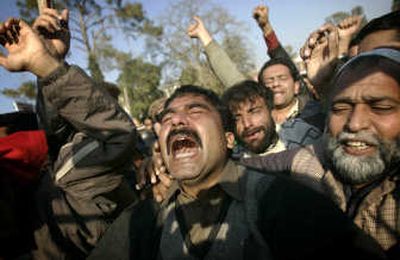Escalating unrest paralyzes Pakistan

KARACHI, Pakistan – Nationwide rioting brought life in Pakistan to a standstill Saturday and forced government officials to consider delaying next month’s elections, as the country continued to be riven with discord over Thursday’s assassination of former Prime Minister Benazir Bhutto.
The toll from the violence passed 40, with many residents staying indoors out of fear and others venturing out to torch government buildings or do battle with police firing tear gas.
The unrest turned streets in this normally frenetic city – Pakistan’s largest – into empty expanses of asphalt. Dozens of burned-out cars and buses lay by the sides of the roads, evidence of nighttime mobs that roamed the city in defiance of a heavy security presence that now includes patrols of army soldiers in addition to police.
Food shortages were reported in some areas, and a nearly complete shutdown of gas stations and other shops brought business to a virtual halt. With a large percentage of the population idle and angry, there was anxiety Saturday that the violence could worsen.
Pakistanis were scheduled to go to the polls Jan. 8, but with the nation on edge, the election commission was expected to convene an emergency meeting Monday to make a decision over whether to postpone the long-awaited vote.
The elections, which will determine who controls parliament and shares power with President Pervez Musharraf, have been seen internationally and domestically as a critical test of Musharraf’s willingness to move the country back toward democracy. In addition to the concerns about violence marring the vote, opposition groups have long said they believe that Musharraf and his allies plan to rig the polls.
Bhutto had been campaigning to win back the prime ministership at a rally in the garrison city of Rawalpindi on Thursday when she was killed in an attack. The strike featured gunshots and a suicide bombing, although the exact circumstances of her death remained a source of major controversy Saturday.
While supporters of Bhutto continued to blame the government – especially allies of Musharraf – for her killing, security officials said Friday they had found evidence that Islamic extremists from al-Qaida and the Taliban had organized the fatal attack.
An Interior Ministry spokesman, Brig. Javed Iqbal Cheema, told a news conference that security personnel had intercepted a conversation in which Taliban leader Baitullah Mehsud “congratulated his people for carrying out this cowardly act.”
Cheema said at his news conference that Bhutto had not been killed by bullets or shrapnel, as initially reported, but had hit her head on a sunroof lever as a bomb blast rocked her vehicle and she ducked for cover from the attack.
“The lever struck near her right ear and fractured her skull,” Cheema said. “There was no bullet or metal shrapnel found in the injury.”
That explanation was hotly disputed by Bhutto’s allies, who said it tended to excuse what they called abysmally inadequate security for Bhutto. They said she had been killed in a well-coordinated strike by people who knew what they were doing.